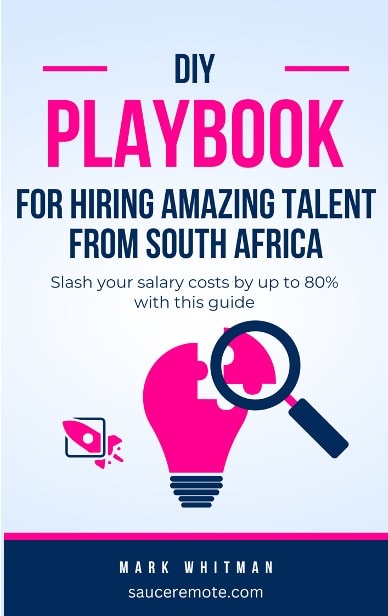Do you know what an international Employer of Record is?
An international Employer of Record is the secret sauce (pun intended) that helps you make more money.
Join me as I discuss international EORs and their benefits and provide tips for choosing the best global EOR.
Ready? Let’s roll.
What Is an International Employer of Record?
An international Employer of Record is a third-party organisation that hires employees on your behalf in a foreign country.
Think of it as having a local partner who handles all the legal and administrative stuff—like payroll, taxes, and compliance—while you focus on running your business.
In other words, it's like having an HR department overseas without actually setting one up yourself.

Discover how to slash your salary costs by 80%
Get our exact process for hiring amazing overseas talent from South Africa. Includes copy-and-paste templates and a detailed salary guide.
Why Consider Using an EOR?
You might be wondering, "Why should I use an EOR instead of hiring directly?" Good question. Here are some benefits that might resonate with you:
- Speedy Market Entry: An EOR can get your team up and running quickly without establishing a legal entity abroad.
- Cost Savings: Setting up a foreign subsidiary can be expensive. An EOR helps you avoid those upfront costs.
- Legal Compliance: Employment laws vary widely from country to country. An EOR ensures you're on the right side of local regulations.
- Less Administrative Hassle: They handle payroll, benefits, and taxes, allowing you to focus on your core business.
You’d think a global EOR would be expensive with all those benefits. But it’s not the case. Let me explain.
Hire remote talent from South Africa & slash salary costs by 80%
Salaries start from £8,000 per year!
How Much Does an Employer of Record Cost?
Let's get down to specifics: what's it going to cost you to use an Employer of Record?
The price can vary based on several factors like the country you're hiring in, the number of employees, and the level of services you need.
Generally, EORs charge in one of two ways:
- Percentage of Salary: Some EORs charge a fee that's a percentage of each employee's salary, often ranging from 10% to 15%. So, if you're paying an employee $50,000 a year, you might pay an additional $5,000 to $7,500 annually for the EOR services.
- Flat Monthly Fee: Others offer a flat rate per employee, ranging from $500 to $2,000 per month. This fee covers all the administrative and legal responsibilities the EOR handles for you.
While these costs might seem significant, think about what you're saving:
- Setting Up a Legal Entity: Establishing your own company abroad can cost tens of thousands of dollars and take months to complete.
- Legal Expertise: Hiring legal and HR experts to navigate foreign laws can add up quickly.
- Avoiding Penalties: Non-compliance with local regulations can result in hefty fines.
Here’s my point: by using an EOR, you're essentially paying for peace of mind.
They handle the complex stuff—like payroll, taxes, benefits, and compliance—so you don't have to.
In many cases, the EOR's fee is a cost-effective alternative to the expenses and risks associated with going it alone in a foreign market.
But is an EOR right for you? Let’s find out.
Hire remote talent from South Africa & slash salary costs by 80%
Salaries start from £8,000 per year!
Is an EOR Right for Your Business?
So, you're weighing your options and wondering if an Employer of Record is the right move for your business.
Let's get down to some practical situations where an EOR can really make a difference:
1. Expanding into New Markets
I've been in situations where the idea of hiring international employees is exciting, but setting up a legal entity feels overwhelming.
With an EOR, you can hire employees in that country without establishing a local company.
It allows you to test the waters and see if the market is right for you—all without a long-term commitment or hefty upfront costs.
2. Hiring Top Talent Abroad
Ever come across a candidate who's perfect for your team but lives halfway around the world?
Instead of letting geography be a deal-breaker, an EOR can help you bring that talent on board legally and efficiently.
They handle all the nitty-gritty details like work permits and local contracts, so you don't have to navigate the complex international hiring laws yourself.
Hire remote talent from South Africa & slash salary costs by 80%
Salaries start from £8,000 per year!
3. Navigating Complex Regulations
Let's be honest: employment laws can be a maze, especially when they're in a different language or cultural context.
An EOR has local experts who understand the ins and outs of these regulations.
They ensure you're compliant with everything from tax laws to employee benefits, saving you from potential legal headaches down the road.
4. Saving Time and Resources
Time is money, right?
Setting up your own entity abroad can take months and divert resources from your core business activities.
Using an EOR streamlines the process. You can start operations almost immediately, which is crucial when time-sensitive opportunities arise.
5. Managing Remote Teams Across Borders
If you're already managing a remote team spread across different countries, you know how complicated payroll and compliance can get.
An EOR simplifies this by handling all the administrative tasks.
They make sure everyone gets paid correctly and on time, adhering to local laws—so you can focus on leading your team effectively.
Hire remote talent from South Africa & slash salary costs by 80%
Salaries start from £8,000 per year!
The Bottom Line: Is an EOR the Right Fit for You?
If any of these scenarios resonate with you, then partnering with an EOR could be a smart move.
It's a practical solution that lets you focus on growing your business without getting bogged down by international bureaucracy.
In my experience, having an EOR is like having a trusted teammate who handles the complexities of global employment, leaving you free to do what you do best.
However, there are some things to keep in mind when searching for the best global EOR.
5 Things to Keep in Mind
Before you jump into a partnership with an Employer of Record, here are some practical tips to help you make the best decision:
1. Do Your Homework
Not all EORs are created equal, and choosing the right one can make a significant difference for your business.
- Check Their Track Record: Look for an EOR with experience in your target country. Ask for client testimonials or case studies that demonstrate their expertise.
- Understand Their Services: Some EORs offer comprehensive packages, while others might provide only basic services. Make sure they cover all the aspects you need—like payroll, compliance, and employee benefits.
- Technology and Communication: Consider how the EOR uses technology. Do they have an online portal for managing employee information? How responsive is their customer service?
Hire remote talent from South Africa & slash salary costs by 80%
Salaries start from £8,000 per year!
2. Understand the Contract
Before signing anything, take the time to read and understand the agreement thoroughly.
- Transparent Fees: Ensure all costs are clearly outlined. Watch out for hidden fees like setup charges or additional costs for terminating the agreement.
- Roles and Responsibilities: Be clear about what the EOR is responsible for and what falls under your purview. This includes understanding liability in case of compliance issues.
- Termination Clauses: Know the terms for ending the contract. Are there penalties for early termination? How much notice is required?
3. Align with Your Long-Term Goals
Think about how an EOR fits into your broader business strategy.
- Short-Term vs. Long-Term Needs: Are you using an EOR as a temporary solution to enter a new market quickly, or do you plan to rely on them for the foreseeable future?
- Scalability: If you plan to expand your team, make sure the EOR can scale with you. Ask about their capacity to handle more employees or additional countries.
- Exit Strategy: If you eventually decide to establish your own entity abroad, find out how the EOR can assist with the transition.
4. Legal and Compliance Assurance
One of the main reasons to use an EOR is to stay compliant with local laws, so make sure they're up to the task.
- Local Expertise: Verify that the EOR has legal experts familiar with the most current employment laws in the country you're targeting.
- Compliance Record: Ask about their history with compliance issues. A reputable EOR should have a clean track record.
- Insurance Coverage: Ensure they have appropriate insurance policies, such as professional indemnity and liability insurance, to protect both parties.
Hire remote talent from South Africa & slash salary costs by 80%
Salaries start from £8,000 per year!
5. Communication is Key
Good communication can prevent misunderstandings and foster a successful partnership.
- Dedicated Support: Will you have a dedicated account manager or point of contact?
- Language and Time Zones: Consider any language barriers or time zone differences that might affect communication.
- Regular Updates: Establish how often you'll receive updates or reports, especially concerning compliance and employee performance.
By keeping these practical tips in mind, you'll be better equipped to choose an EOR that aligns with your needs.
My Final Thoughts
And there you have it: Now you know everything you need about an international employer of record. What’s next? Contact Sauce and find out how their international EOR can help you make money.
